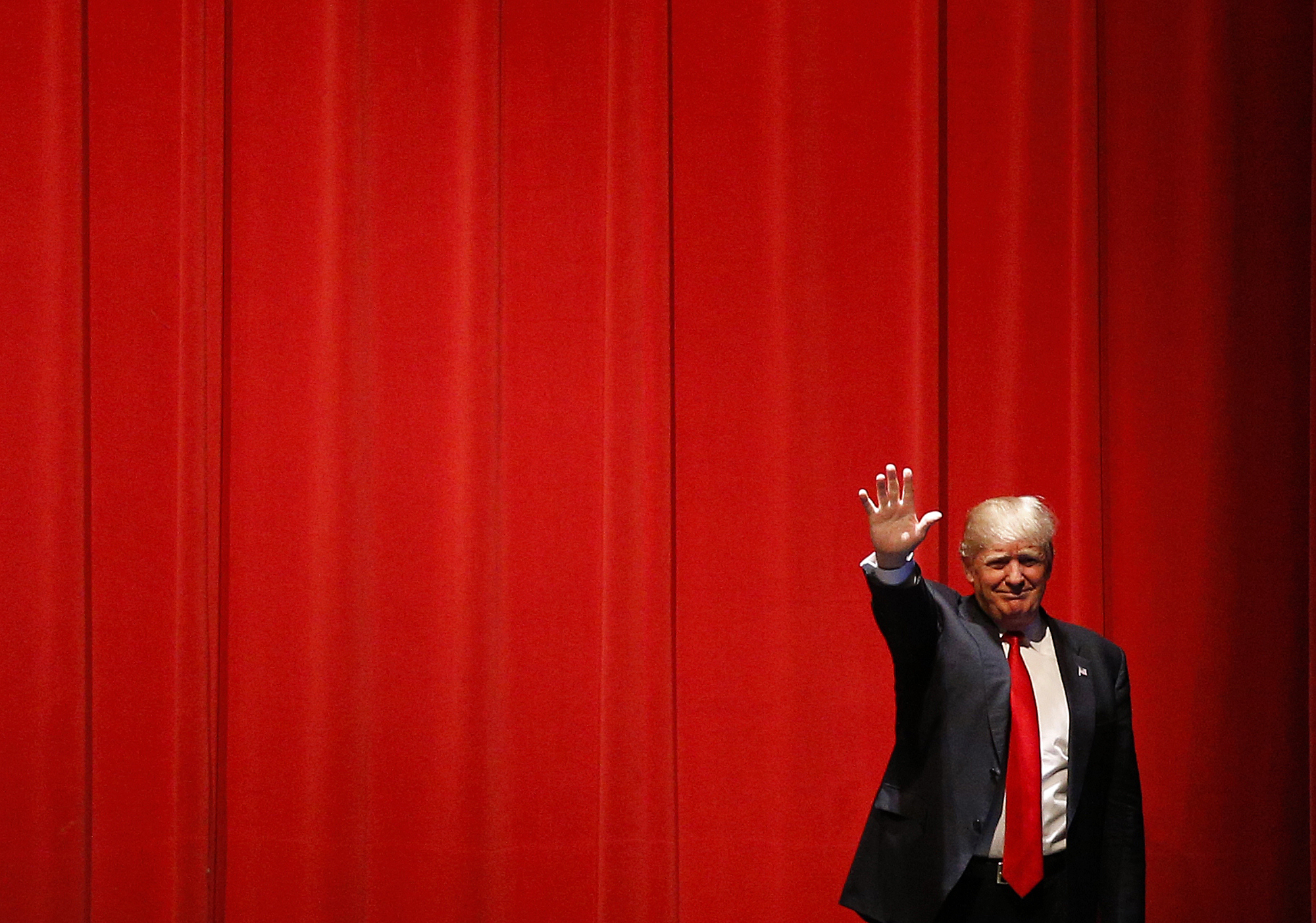The Republican Party can recover from Donald Trump faster than you think
Trump will destroy the Republican Party? Don't be so sure.


What if the Republican Party isn't doomed?
The consensus tells us Donald Trump is about to destroy the GOP. He has backed away from his pledge to support the eventual nominee of the party if it's not him, saying he has been treated unfairly. Everyone is asking why Republicans haven't done more to avert the coming disaster.
And pundits tell us that the Republican Party of the Bush years is dying no matter what. Writing in The Atlantic, David Frum warns that rallying to Trump would change the direction of the GOP. And running a conservative third-party challenger to compete with Trump may have a similar effect: Splitting a party means abandoning it to your factional enemies.
The Week
Escape your echo chamber. Get the facts behind the news, plus analysis from multiple perspectives.

Sign up for The Week's Free Newsletters
From our morning news briefing to a weekly Good News Newsletter, get the best of The Week delivered directly to your inbox.
From our morning news briefing to a weekly Good News Newsletter, get the best of The Week delivered directly to your inbox.
After Paul Ryan gave a speech that was critical of Trump without ever naming him or making the case against him, New York Times columnist Ross Douthat criticized Ryan for his paralysis. For Douthat, Paul Ryan and the party he leads are proving themselves unable to absorb the most compelling parts of Trumpism, namely its solicitousness of working-class voters. And yet that same party is also unable to forcefully reject Trump the candidate.
But perhaps fretful paralysis is good enough for now. Whatever becomes of Donald Trump's moment in politics, there are reasons to believe this moment is unsustainable and the basic status quo of the Republican Party will eventually emerge triumphant.
Let's posit that, on or off the ticket, Donald Trump will cause an electoral disaster for Republicans.
If he is the nominee, Trump depresses the turnout and activism of churchy Republicans and other social conservatives. He repulses suburban women, and further alienates younger upwardly mobile Republicans. If he is not the nominee, but is the leading vote-getter, the Republican machinations to deny him the nomination alienate a large number of Trumpistas from the party and the effect is just about the same: Republicans lose Pennsylvania, North Carolina, Virginia, and other states by larger than normal margins. Perhaps it is so bad that Republicans not only lose the Senate, including a few talents like Rob Portman, but the House as well.
A free daily email with the biggest news stories of the day – and the best features from TheWeek.com
What happens then? Hillary Clinton wins. Justice Scalia's seat is filled by a justice who is much more liberal than he was. Clinton is given a two-year mandate to do something big on the progressive wish list. Having defeated the most anti-immigrant candidate in modern history, she may go for comprehensive immigration reform. As a bonus, what she does isn't something that threatens to immediately raise taxes on the millions of affluent and moderate voters that supported Clinton over Trump.
These are all defeats for the Republican Party. And they will naturally bring about some expectations for an enduring Democratic majority. But at the same time that Clinton has a unified government, or close to one, the media will question whether she really has a mandate, since the other major party found itself, by virtue of some flukes and quirks, unable to field an impressive candidate. The flukiness of the Republican nominating process ends up infecting the Democratic victor too.
By 2018, the strength of the Republican Party will be ready to reassert itself, perhaps without a major rethink. Matthew Yglesias has made the case that Republicans possess unprecedented strength and numerical superiority at the foundational level of American politics: state legislatures. This means a larger bench from which to select candidates for federal offices or higher offices at the state level. It also helps attract ambitious talent into the party for the foreseeable future. Dying parties don't have this kind of strength. Clinton's presidency, still fresh, will do the work Republican candidates have so far been unable to do: unify the party.
After Super Tuesday, I predicted that the GOP would rally to Trump in the hopes that by accepting the unhappy marriage with a smile, they could change the suitor over time. I was wrong; the party hasn't resolved itself to Trumpism. After the initial wave of endorsements from Paul LePage and Chris Christie, and flirtatious gestures by Rudy Giuliani and Newt Gingrich, the flood of support never materialized. Mitt Romney's unprecedented attack on his party's frontrunner stopped the momentum. And it has become harder to regain, particularly as the Trump campaign seems to be losing steam at the exact moment when a frontrunner is normally romping to the end zone.
The party has been unable to co-opt Trump, unable to endorse him, unable to oppose him effectively. But Trump is not going to bequeath to Republicans a squadron of Trumpistas in Congress. He is not going to build the kind of institutions that ideologues use to pressure a major political party. He's just going to make a spectacle of himself. Barring a black swan event, he will fade away.
The GOP will still have all the problems that pre-dated Trump and that only he exposed. A plurality of its voters will still be unsatisfied with the party's agenda, especially on the economy. It will still have problems with young voters, and still have a long-term demographic problem. Its philosophy will still be outdated.
But by 2018, all the talk of bloodbaths and schisms and fracturing will go away. The party will have powers to exercise, sinecures to offer, and orthodoxies to protect again. The party will get out of its hospital ward and move on. It will shock you how much it never happened.
Michael Brendan Dougherty is senior correspondent at TheWeek.com. He is the founder and editor of The Slurve, a newsletter about baseball. His work has appeared in The New York Times Magazine, ESPN Magazine, Slate and The American Conservative.
-
 31 political cartoons for January 2026
31 political cartoons for January 2026Cartoons Editorial cartoonists take on Donald Trump, ICE, the World Economic Forum in Davos, Greenland and more
-
 Political cartoons for January 31
Political cartoons for January 31Cartoons Saturday's political cartoons include congressional spin, Obamacare subsidies, and more
-
 Syria’s Kurds: abandoned by their US ally
Syria’s Kurds: abandoned by their US allyTalking Point Ahmed al-Sharaa’s lightning offensive against Syrian Kurdistan belies his promise to respect the country’s ethnic minorities
-
 The billionaires’ wealth tax: a catastrophe for California?
The billionaires’ wealth tax: a catastrophe for California?Talking Point Peter Thiel and Larry Page preparing to change state residency
-
 Bari Weiss’ ‘60 Minutes’ scandal is about more than one report
Bari Weiss’ ‘60 Minutes’ scandal is about more than one reportIN THE SPOTLIGHT By blocking an approved segment on a controversial prison holding US deportees in El Salvador, the editor-in-chief of CBS News has become the main story
-
 Has Zohran Mamdani shown the Democrats how to win again?
Has Zohran Mamdani shown the Democrats how to win again?Today’s Big Question New York City mayoral election touted as victory for left-wing populists but moderate centrist wins elsewhere present more complex path for Democratic Party
-
 Millions turn out for anti-Trump ‘No Kings’ rallies
Millions turn out for anti-Trump ‘No Kings’ ralliesSpeed Read An estimated 7 million people participated, 2 million more than at the first ‘No Kings’ protest in June
-
 Ghislaine Maxwell: angling for a Trump pardon
Ghislaine Maxwell: angling for a Trump pardonTalking Point Convicted sex trafficker's testimony could shed new light on president's links to Jeffrey Epstein
-
 The last words and final moments of 40 presidents
The last words and final moments of 40 presidentsThe Explainer Some are eloquent quotes worthy of the holders of the highest office in the nation, and others... aren't
-
 The JFK files: the truth at last?
The JFK files: the truth at last?In The Spotlight More than 64,000 previously classified documents relating the 1963 assassination of John F. Kennedy have been released by the Trump administration
-
 'Seriously, not literally': how should the world take Donald Trump?
'Seriously, not literally': how should the world take Donald Trump?Today's big question White House rhetoric and reality look likely to become increasingly blurred
